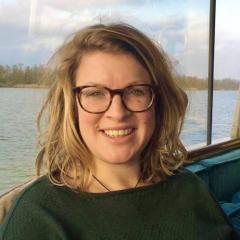Vocabulary (15) Share Copied!
Exercises Share Copied!
These exercises can be done together during conversation lessons or as homework.
Exercise 1: Conversation exercise
Instruction:
- Waar ben je opgegroeid? Op het platteland of in de stad? (Where did you grow up? On the countryside or in the city?)
- Moest je voor dieren zorgen? Boerderijdieren of huisdieren? (Did you have to care for animals? Farm animals or pets?)
- Wat vind je van het stierenvechten in Spanje? (What do you think of the bull fighting in Spain?)
Teaching guidelines +/- 10 minutes
Example phrases:
|
Ik ben opgegroeid op het platteland. I grew up on the countryside. |
|
Mijn familie heeft een boerderij, dus ik hielp veel met de verzorging van de varkens, koeien en kippen. My family has a farm so I helped a lot to care for the pigs, cows and chicken. |
|
Ik ben opgegroeid in een kleine stad. Mijn familie had een hond. Ik hielp om voor hem te zorgen. I grew up in a small city. My family had a dog. I helped to care for him. |
|
Ik ben opgegroeid in Berlijn, de hoofdstad van Duitsland. We hadden maar een klein appartement, dus hadden we nooit een huisdier. I grew up in Berlin, the capital of Germany. We only had a small apartment so we never had a pet. |
|
Ik denk dat stierenvechten een belangrijke traditie in Spanje is en ik wil graag een gevecht zien. I think the bull fighting is an important tradition in Spain and I want to see a fight. |
|
Het stierenvechten in Spanje is wreed. Die traditie moet snel eindigen om de stieren te beschermen. The bull fighting in Spain is cruel. That tradition has to end soon to protect the bulls. |
| ... |
Exercise 2: Dialogue Cards
Instruction: Select a situation and practice the conversation with your teacher or fellow students.
Exercise 3: Match a word
Instruction: Match the translations
Exercise 4: Cluster the words
Instruction: Sleep de woorden naar de juiste categorie: woorden die je op de boerderij vindt versus woorden die bij het dorp en de natuur horen.
Woorden van de boerderij en boerderijdieren
Woorden van het dorp en de natuur
Exercise 5: Samengestelde zelfstandige naamwoorden
Instruction: Fill in the correct word.
Grammar: Compound nouns
Show translation Show answersplattelandsdorp, boerderijdeur, kippenstal, plattelandshuis, geitenstal, varkensvoer
Exercise 6: Onbepaalde telwoorden (veel, weinig, wat)
Instruction: Fill in the correct word.
Grammar: Indefinite numerals (veel, weinig, wat, ...)
Show translation Show answersveel, weinig, wat, Sommigen, geen, genoeg, een paar
Grammar Share Copied!
It's not the most exciting thing, we admit, but it’s absolutely essential (and we promise it'll pay off)!
A2.18.2 Grammatica
Onbepaalde telwoorden (veel, weinig, wat)
Indefinite numerals (veel, weinig, wat, ...)
Verb conjugation tables for this lesson Share Copied!
Ontdekken to discover Share Copied!
Onvoltooid toekomende tijd (OTTk)
| Dutch | English |
|---|---|
| (ik) zal hebben ontdekt / zal ontdekt hebben | I will have discovered |
| (jij) zal hebben ontdekt / zal ontdekt hebben | You will have discovered / you will have discovered |
| (hij/zij/het) zal hebben ontdekt / zal ontdekt hebben | he/she/it will have discovered |
| (wij) zullen hebben ontdekt / zullen ontdekt hebben | we will have discovered / we will have discovered |
| (jullie) zullen hebben ontdekt / zullen ontdekt hebben | you will have discovered |
| (zij) zullen hebben ontdekt / zullen ontdekt hebben | they will have discovered |
Voeden to feed Share Copied!
Onvoltooid toekomende tijd (OTTk)
| Dutch | English |
|---|---|
| (ik) zal gevoed hebben | I will have fed |
| (jij) zal/zult gevoed hebben | You will have fed |
| (hij/zij/het) zal gevoed hebben | he/she/it will have fed |
| (wij) zullen gevoed hebben | we will have fed |
| (jullie) zullen gevoed hebben | you will have fed |
| (zij) zullen gevoed hebben | They will have fed |
Don't see progress when learning on your own? Study this material with a certified teacher!
Do you want to practice Dutch today? That is possible! Just contact one of our teachers today.
























